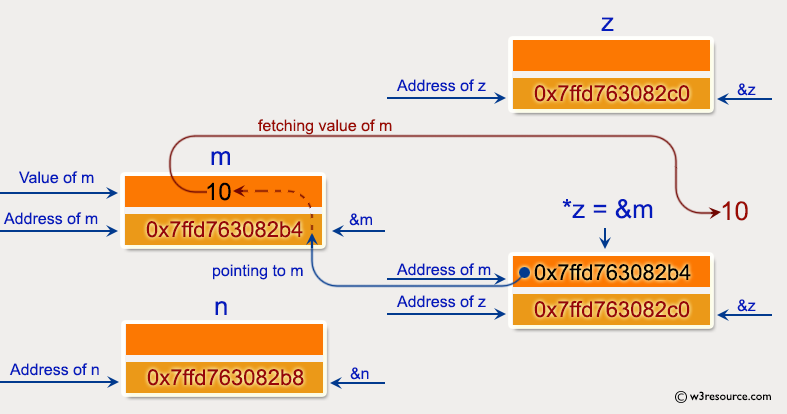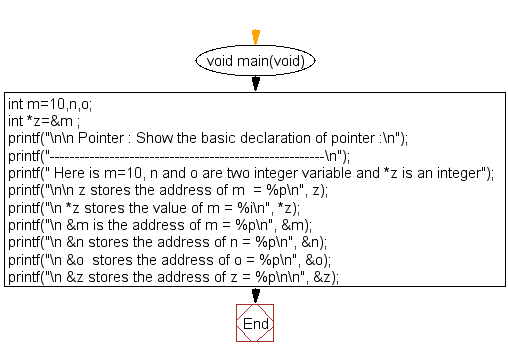C Exercises: Show the basic declaration of pointer
C Pointer : Exercise-1 with Solution
Write a program in C to show the basic declaration of pointer.
Pictorial Presentation:

Sample Solution:
C Code:
#include <stdio.h>
void main(void)
{
int m=10,n,o;
int *z=&m ;
printf("\n\n Pointer : Show the basic declaration of pointer :\n");
printf("-------------------------------------------------------\n");
printf(" Here is m=10, n and o are two integer variable and *z is an integer");
printf("\n\n z stores the address of m = %p\n", z); // z is a pointer so %p would print the address
printf("\n *z stores the value of m = %i\n", *z);
printf("\n &m is the address of m = %p\n", &m); // &m gives the address of the integer variable m
// so %p is the specifier for that address
printf("\n &n stores the address of n = %p\n", &n);
printf("\n &o stores the address of o = %p\n", &o);
printf("\n &z stores the address of z = %p\n\n", &z); // &z gives the address, where the pointer z is
// stored -> still an address -> %p is the right
// specifier
}
Sample Output:
Pointer : Show the basic declaration of pointer :
-------------------------------------------------------
Here is m=10, n and o are two integer variable and *z is an integer
z stores the address of m = 0x7ffd763082b4
*z stores the value of m = 10
&m is the address of m = 0x7ffd763082b4
&n stores the address of n = 0x7ffd763082b8
&o stores the address of o = 0x7ffd763082bc
&z stores the address of z = 0x7ffd763082c0
Flowchart:

C Programming Code Editor:
Have another way to solve this solution? Contribute your code (and comments) through Disqus.
Previous: C Pointer Exercises Home
Next: Write a program in C to demonstrate how to handle the pointers in the program.
What is the difficulty level of this exercise?
Test your Programming skills with w3resource's quiz.
C Programming: Tips of the Day
Static variable inside of a function in C
The scope of variable is where the variable name can be seen. Here, x is visible only inside function foo().
The lifetime of a variable is the period over which it exists. If x were defined without the keyword static, the lifetime would be from the entry into foo() to the return from foo(); so it would be re-initialized to 5 on every call.
The keyword static acts to extend the lifetime of a variable to the lifetime of the programme; e.g. initialization occurs once and once only and then the variable retains its value - whatever it has come to be - over all future calls to foo().
Ref : https://bit.ly/3fOq7XP
- New Content published on w3resource:
- HTML-CSS Practical: Exercises, Practice, Solution
- Java Regular Expression: Exercises, Practice, Solution
- Scala Programming Exercises, Practice, Solution
- Python Itertools exercises
- Python Numpy exercises
- Python GeoPy Package exercises
- Python Pandas exercises
- Python nltk exercises
- Python BeautifulSoup exercises
- Form Template
- Composer - PHP Package Manager
- PHPUnit - PHP Testing
- Laravel - PHP Framework
- Angular - JavaScript Framework
- Vue - JavaScript Framework
- Jest - JavaScript Testing Framework
